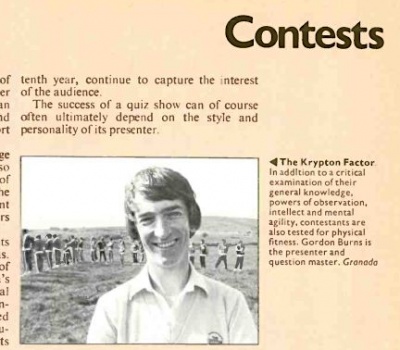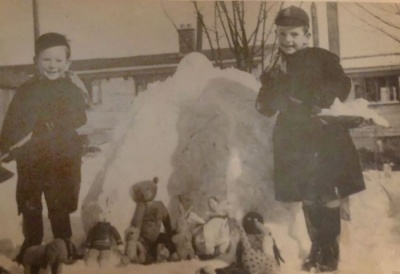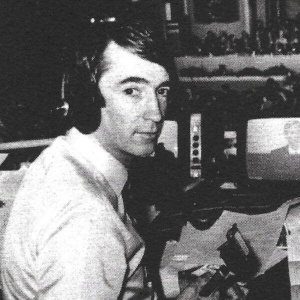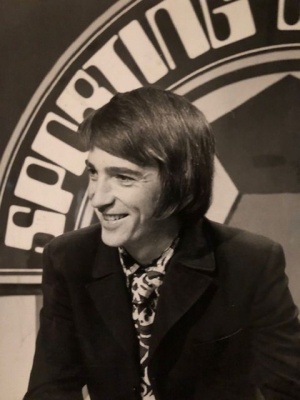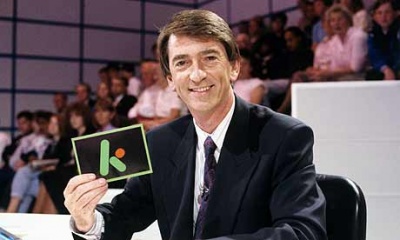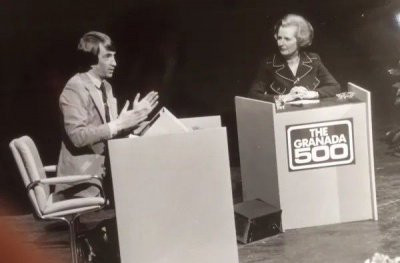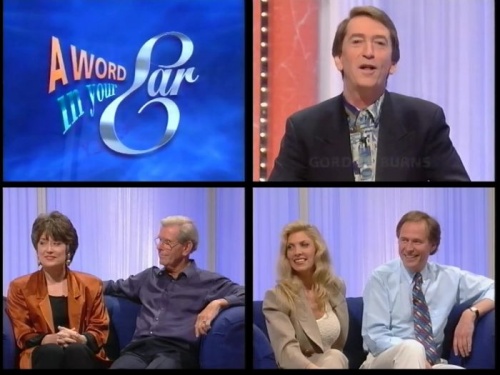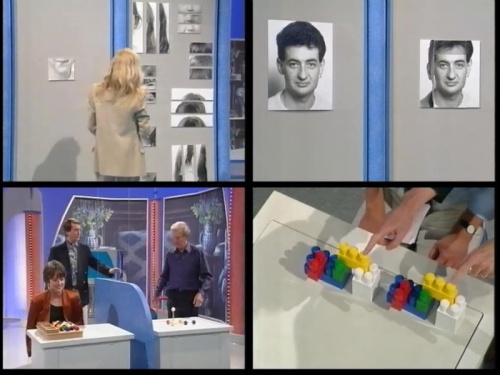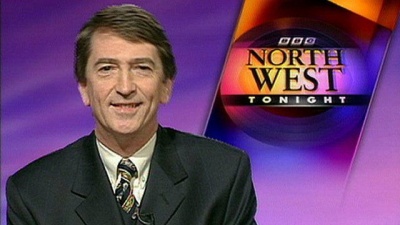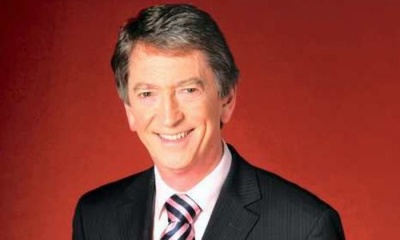Weaver's Week 2023-08-06
Last week | Weaver's Week Index | Next week
The 1981 IBA Yearbook noted, "The success of a quiz show can of course often ultimately depend on the style and personality of its presenter." Immediately below, a picture of Gordon Burns.
Contents |
Gordon Burns
Gordon Henry Burns was born on 10 June 1942 in Belfast. His family moved to Kent, after his father was required to work on Hansard at Westminster; Gordon commuted to Dulwich College in central London for an education. His history teacher was a frightful bore, because it seems to be a qualification for the job; but did drum one motto into young Gordon: "don't be dull, be different".
Later, the family returned to Belfast, and Gordon completed his education at the city's Campbell College. While there, he got caught up in the football wars – rugby or round-ball? The school supported rugby, Gordon preferred soccer, and found himself the only boy capable of writing down the results. He got his father's secretary to run off copies, and sold them in school for sixpence. The headmaster was not pleased, and banned Gordon from selling his newspaper in school. Gordon sold the paper just outside the school gates, and found that a banned magazine has an allure of its own.
After school, young Gordon started on the Belfast Telegraph newspaper. There was journalism right through his family tree – his father edited the Lisburn Standard, his maternal grandfather for the rival Lisburn Herald. Perhaps his ancestors reported on more exciting things than the campaign for a zebra crossing in Larne.
Gordon's passion was sport, and he moved to London to work on Sports Report in the BBC Light Programme. He joined Ulster Television as their sports editor in 1967, and a presenter on UTV Reports two years later. He became a vaguely familiar face on the mainland, as one of the reporters for ITN's coverage of the civil war in Northern Ireland. He also hosted The Gordon Burns Hour, a discussion programme about life in Northern Ireland, sometimes linking up with RTÉ's The Late Late Show which also aired on Saturday evenings.
Gordon moved back across the water in 1973, joining Granada for their nightly news programme Granada Reports and some editions of their worthy current affairs show World in Action. Granada always wanted to make quality television. When you see "Granada" on screen, we were meant to think "solid, reliable, trustworthy, dependable". It was a difficult environment, but it brought the best out of everyone. To succeed, you had to be good, and you had to deliver every time. Whether that's with high budget drama like Brideshead Revisited, quotidian soaps like Coronation Street, or the regional news – the word was quality.
Granada Reports was quality, and it was a hotbed of innovation. Every year, they'd change the set, change the music, change the producer. One year, the show looks like a single presenter in a News Cockpit; next year, they've four presenters sitting at their own part of the Fact Snake. Only the on-screen talent remained the same, not least the very driven and very clever Tony Wilson.
Jeremy Fox had been appointed editor of Granada Reports. He was bright, thrusting, thought he knew how to make television leap out of the screen. And although he was the son of the television exec Paul Fox, any hint of nepotism lasted no longer than a sunny spell on a Manchester weekend. Jeremy Fox wanted to make television entertainment, and Granada approved one of his more outlandish pilots.
The Krypton Factor
The Krypton Factor is a test for the ultimate Superperson. They must come through many gruelling rounds of physical, mental, and psychological tests. Nothing as ordinary as "points" on this show – no, the count is of the contender's Krypton Factor, and whoever's got the highest Krypton Factor at the end of the show will continue their journey.
So, how did the serious journalist Gordon get to do The Krypton Factor? Mike Scott, another Granada journalist, had recorded the pilot, but found he was unavailable for the full series. Serious journalist Gordon Burns took the job for two reasons – he was convinced it would be a one-series wonder, and to help out his producer friend Jeremy Fox. See, the upmarket and sober quiz needed an upmarket and sober host, someone who could remain calm and unruffled whatever happened. And that was Gordon Burns in a nutshell.
Over the years, the Week has accumulated reviews of most formats – we looked at a 1984 episode on 5 August 2012; the 1995 fever dream relaunch on 17 July 2011; and Ben Shepherd's revival on 11 January 2009. Since then, a number of episodes from the 1977 first series have turned up on the internet, so let's set the time machine back to a Wednesday night. (Wednesday? Yes; The Krypton Factor didn't get its Monday night slot for a few years.)
It's very much a work in progress. The opening music is suitably futuristic and wibbly-wobbly, Mike Moran's work would fit on The Old Grey Whistle Test, and perfectly counterpoints the moody shots of contenders on the assault course. Gordon Burns is in The Future Zone, a white studio with the audience concealed out of shot. Had they invented Canned Crowd™ at this early date?
Gordon opens the show with a long talk about the programme, introducing the contestants, and smiling while he's doing it. To help Gordon remember to smile, he asked the audience to pull funny faces while he's doing this long talk. When it came to record the semi-finals, one of the contestants – a university student from Liverpool – brought half-a-dozen supporters with him, and they were sat on the back row of the audience. And when Gordon began his long opening witter, the students stood up, turned to the back wall, and dropped their trousers. On their buttocks, in felt-tip pens, they'd spelled out "Gordon Burns". The host never needed to ask the audience to make him laugh, not when he has this memory.
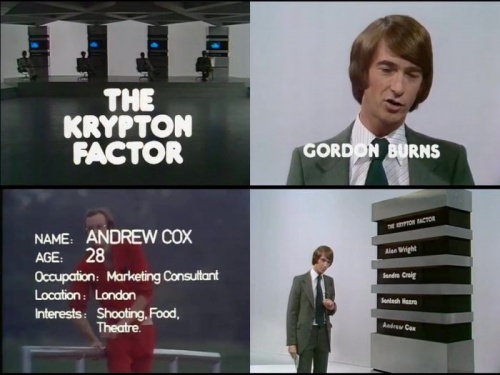 From the 1977 series: establishing the studio, the host, a contestant introduction, and the master scoreboard.
From the 1977 series: establishing the studio, the host, a contestant introduction, and the master scoreboard.
The opening round is "Intelligence", or as we'd later call it, "Mental agility". In one sample episode, contenders are asked to repeat a series of numbers backwards; only one player is able to complete a series of five correctly. In another, players use their keypads to note which statements are false. "Physical ability" is done on an assault course the army have built, but it's about the size of a running track, and is mostly jumps for length and height with a bit of crawling. They hadn't yet invented the aerial slide – that would emerge a few years later, as the course moved to its iconic location on Holcombe Moor.
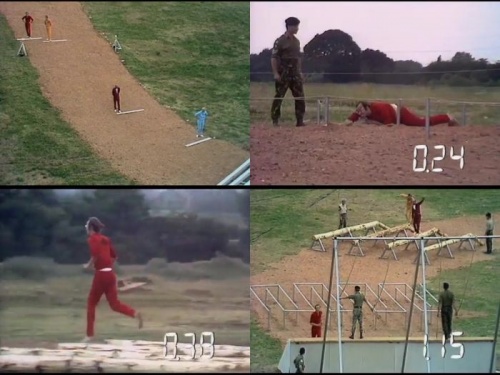 The original assault course was in an oval, with staggered start, and mostly flat obstacles. A clock was on screen throughout.
The original assault course was in an oval, with staggered start, and mostly flat obstacles. A clock was on screen throughout.
Something very odd next, a "Personality" round. The contestants have been asked to write something on a topic (consumer complaints from the year 2077) with as much wit and wisdom as possible, and deliver it to camera. The pilot episode had been really highbrow, with psychologist Dr. Laurie Taylor analysing contestants' personalities. For the series, Dr. Taylor was let go (he'd wind up on Radio 4, hosting The Afternoon Shift and Thinking Allowed). The producers then used an opinion pollster to find out which was the "best" entry, however the public defined it. This round must have been very expensive to research, as reputable opinion pollsters aren't cheap; and it's a bit handwavey nebulous. No surprise that "Personality" was dropped after this one series, replaced by the "Intelligence" rounds we know and hate.
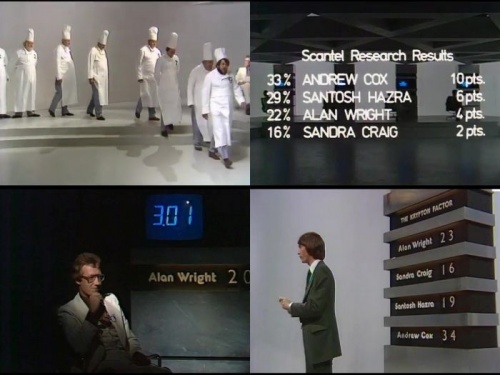 Chefs walk down for the identity parade, the results of an opinion survey, the general knowledge round last three minutes, and Gordon gives the final scores.
Chefs walk down for the identity parade, the results of an opinion survey, the general knowledge round last three minutes, and Gordon gives the final scores.
"Observation" was a clip from a movie, then three assigned questions – one with options, a visual question, and a verbal detail – plus the identity parade (which of these nine cooks is the real one?) "General knowledge" was the chain of questions, each linked in some way to the last, played for three minutes and more.
What did Gordon Burns bring to this programme? He's an upmarket and sober host, explains what The Krypton Factor tries to do, and gives questions calmly and clearly. Most important, he's got experience from the sports department, and brings the assault course to life, commentating as though it's a crucial match or proper professional race. Gordon was interested in the event, not least when there's a close finish – he conveyed this enthusiasm to us at home, and we were interested in The Krypton Factor.
Gordon also contributed ideas to the programme – they introduced a flight simulator round in 1986, and revamped the Observation round into a specially-shot serial. Both were Gordon's ideas. He also did the tests for the Intelligence round, make sure they were all possible, and often brought some sandwiches into the studio with him.
Surprise!
The success of The Krypton Factor made Gordon Burns into a household name; it also limited his career. Instead of doing more journalism and sports reports, Gordon left Granada, went freelance, and became a professional game show host.
His first engagement was a series of Password for UTV, with the heady combination of "that sensible bloke from Krypton Factor" and some big names (Linda Lusardi, Danny La Rue). The basic idea of Password has celebrities and members of the public guessing words based on clues given by their teammates. We'll discuss the format further when ITV's latest revival comes to air.
Gordon was also brought onto Surprise Surprise with Cilla Black, ostensibly to do a one-off quiz segment. That segment fell through, and Gordon got to do the "Searchline" feature, where people try to find their old school friends who they've not seen in forty years. Cilla insisted that Gordon stay for the series, and it turned into a five-year gig.
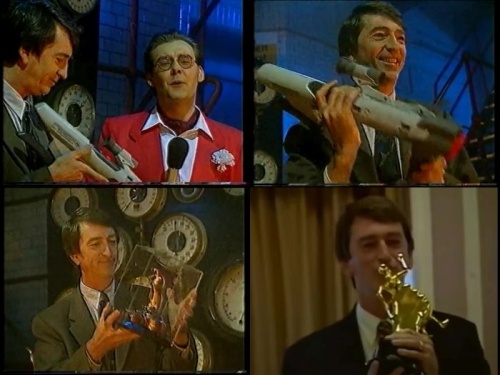 Gordon won a Gamesmaster golden joystick for winning a Tetris-and-shooting game; and got the Gotcha from Noel Edmonds in a mildly amusing setup.
Gordon won a Gamesmaster golden joystick for winning a Tetris-and-shooting game; and got the Gotcha from Noel Edmonds in a mildly amusing setup.
Gordon continued to keep his oar in as a journalist, covering party conferences, and a regular reported on Channel 4's Irish Angle programme. But we were more likely to see him on Gamesmaster or being Gotchaed by Little Noely. He presented Treasure Trail for Meridian in 1994, we've not been able to find anything more about this programme.
A Word in Your Ear
We have been able to track down A Word in Your Ear, a communications show Gordon made for off-peak BBC1. The basic idea is terribly simple: one player talks, the other listens. Played by celebrity pairs, our sample episode features singer Lyndsey de Paul and television presenter Nick Owen against television critic Philippa Kennedy and the legendary Bob Holness.
Some very brief introductions, and the show begins quickly with a drawing round. One player is given a regular object to describe, and must give instructions so their partner can draw it. Only geometric terms can be used – "draw a large circle halfway up the page in the middle", but not "draw a saucepan".
We're allowed to play along with this round at home – the thingie is briefly displayed on screen, but then goes off again. After the minute-and-a-half has finished, the describer can turn round – "but don't say a word" before the drawer makes one last guess. Gordon then awards points out of ten.
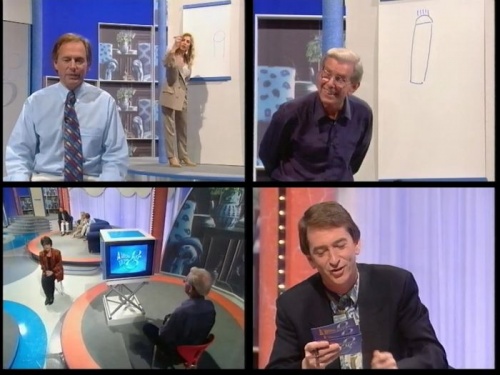 Nick talks while Philippa draws; Bob looks for help completing his picture of a lighthouse; Bob commentates on action; and Gordon shows his absolute mastery of Host Holding a Question Card.
Nick talks while Philippa draws; Bob looks for help completing his picture of a lighthouse; Bob commentates on action; and Gordon shows his absolute mastery of Host Holding a Question Card.
Round two is the commentary round. One of the team is shown a film clip of everyday action – a mountain bike race, or something like that. Their aim is to narrate everything that appears on screen, because their partner will be asked five questions about the clip. Has Bob mentioned what colour the guide tapes are? Did Philippa mention what that bloke was wearing? Again, Gordon awards marks out of ten.
Next comes the photofit round. One of the team can see a photograph of someone. Their partner has possible bits that could compile to make the photograph. Can our players identify the correct bits – chin, nose, eyes, forehead, crown, left and right ears? And can they do it against the clock, and without putting anything back – once you've selected a piece off the board, it's got to be used. Marks out of ten, once more.
Then it's straight on to the construction round. One of the team sees a molecular construction – a thingie made up of half-a-dozen coloured balls and connecting struts, or out of oversized construction bricks. It can be in three dimensions, with elements above each other. Two minutes to replicate from one side to the other, and marks out of ten.
Final round of A Word in Your Ear describes famous books or film titles or tv shows or similar. Easy, right? Wrong – you can't use any part of the word you're trying to convey. So "Give us a Clue" could be "Donate! Let go! Hint! Assist!" – and hope the partner can fill in the middle bits. Or "this person had a number of small accomplices" for "Snow White and the Seven Dwarves". Two minutes, ten to get, and Gordon awards roughly one point per correct answer.
They have been keeping score through the show, and are honour bound to declare a winning team. A Word in Your Ear is an energetic programme, it's difficult to watch without playing along to some extent. There's a different playing area for each round, lots of chairs and stools for the prop dressers. And there's a gentle education – we can learn through other people's misfortune, identify strategies that work and techniques that don't go so well.
Many of these rounds were recycled into Relatively Speaking, played with civilian families and for actual prizes. This 1996 one-series wonder is best remembered for a "describe what you see" virtual world endgame. Gordon didn't only present these shows, but co-devised and co-produced them.
Back to the newsroom
By 1996, The Krypton Factor had been decommissioned – it didn't fit the younger, thrusting, ITV. The new network controllers wanted mass-appeal programmes, lowbrow stuff. Never mind the quality, just bring the ratings. It gave Gordon the one chance to do something vaguely political in real life – when the warmongering IRA broke their ceasefire and renewed the civil war in 1996, he helped to organise public protests in towns and cities across Ireland, keeping Politicians and Sundry Elected Folk away.
Gordon Burns returned to his roots, went back to television journalism, and joined the BBC to host North West Tonight for fifteen years. From 1997 to 2011, a comfortable and familiar face gave the news, made sure to ask the difficult questions, and brightened up teatimes across the region. His interviewee wishlist for his final week before retirement included football manager Alex Ferguson and comedian Peter Kay, culminating in Peter giving the Burns family a lift to his own sell-out show at the Manchester Arena afterwards.
After leaving the BBC, Gordon set up a media training company – how to handle television interviews, give good soundbites to radio, that kind of thing. Always answer the question, that's one key point to remember – viewers and interviewers know when an answer isn't complete. Gordon also spends time with the Prevent Breast Cancer charity, and pops up with Radcliffe and Maconie on their "The Chain" feature. We don't think The Chain has featured one of Gordon's more distant relations, his second cousin Ed Sheeran is a jobbing pop musician.
 Gordon Burns' cousin Ed Sheeran (second right) on a North American tour with Khalid (second left) and Rosa Linn (centre), and their management.
Gordon Burns' cousin Ed Sheeran (second right) on a North American tour with Khalid (second left) and Rosa Linn (centre), and their management.
Perhaps the best testament to Gordon Burns' skill came when he interviewed Gerry Adams of Sinn Féin, a political party often linked with the IRA. Adams ended the interview with a comment, "Mind you, I liked that Krypton Factor programme. I really liked the assault course. I keep myself fairly fit – I think I'd be quite good at that."
Gordon recounts his response: "I said 'you wouldn't have got past the third obstacle' and he looked quite upset. So I said 'I'll go further, you wouldn't get past the first obstacle. You're forgetting one thing, our assault course is filmed at a British Army base in England and there are British Army soldiers standing at every obstacle'."
The room fell silent.
"And then he burst out laughing and everybody else joined in."
Gordon Burns marked his golden wedding anniversary in 2021 with wife Sheelagh. They've a son and daughter, and grandchildren, and we wish them many more long and happy years of retirement together.
In other news
TAP out After two years, TAP Music has ended its creative partnership with the BBC Eurovision Song Contest team. They were responsible for "Space man", which finished second in the 2022 contest; and "I wrote a song" which was less successful this year.
That's showbusiness! We aren't able to publish detailed television ratings any more, and cannot see if ITV's Cooking With the Stars is being beaten by streamers watching children's show Bluey. Nor do we know if as many people saw The Traitors Australia on BBC3 as on commissioning channel Network 10.
We do know ratings for Radio 2 in the last quarter, and we can attempt to see if Ten to the Top with Gary Davies and Vernon Kay is more popular than Popmaster with Ken Bruce. Just under 3 million people a week tuned into something of Ken Bruce's show on Greatest Hits Radio; we'd be surprised if half of them listen to the Popmaster quiz on any given day. Over on Radio 2, the Davies-Kay duo gets just under 7 million listeners per week; we'd eyeball that at about 2 million Ten to the Toppers each day.
That makes Ten to the Top about as popular as Pointless Celebrities, and Popmaster somewhere around House of Games. Clearly, both shows need more Richard Osman.
From the archives A Stars in their Eyes live final, Film Buff of the Year, and the faces of 2003 – Jon Tickle and Alex Parks. That's all in the Why Don't Youtube weekly newsletter, with added Roland Rat.
Down under Our friends at Buzzerblog report that Millionaire Hot Seat will come off air at the end of the year after almost 15 years on air. Hot Seat is fifteen questions and a queue of contestants, whoever's at the front plays, they can pass and rotate to the back of the queue, and leave the show if they give an incorrect answer.
The rumoured replacement is Tipping Point Australia; contestants put counters in the Win Zone, and hope they fall onto the Lower Tray, then drop to the Upper Tray, and there's a big prize for correctly getting counters out of the nominated Drop Zone.
Quizzy Monday
The best-dressed team on Only Connect looks set to be won by the Stitchers. They also beat the Roadies quite comfortably in their opening heat, thanks to the most popular internet browsers, Mumford and Sons, and an encyclopaedic knowledge of musicals and their protagonists. These Stitchers could go far.
This week, the Antiphons (choral music participants) beat A Drop of Red (wine fans), but just by the one point 21-20. This episode contained the inevitable Liz Truss Memorial Question, about types of lettuce. There was also a list of Generation Game presenters, and a mapping of new GCSE grades against the ones Victoria picked up in 1988. Antiphons slipped on the walls, but won the other three matches. Wouldn't be surprised to see both these teams in the quarter-finals.
On University Challenge, Aberdeen took another victory over Birmingham. The sides were close together until three-quarters time, when Aberdeen got a little ahead, Birmingham took a couple of penalties in haste to catch up, and the game was won. A few teething problems with the new scoreboard; credit was only given for one music bonus when two were correct, so the accurate score was 195-125, not the 190-125 reported on screen. Wouldn't have happened in Paxman's day.
Birkbeck beat Oxford Brookes by 220-205, the match may have been decided in the opening moments when Oxford's captain gave an incorrect interruption. John Manton went on to make lots of buzzes, and almost immediately redeemed himself with a set of bonuses on the Biafran war. We appreciated a description of Kodiak Island as "half the size of Wales", finally someone uses the correct unit of area. Birkbeck only clinched the game on the last starter, and they only got to hear about Taylor Swift's "All too well" video because Birkbeck had correctly interrupted all three bonuses on fictional castles just before.
Quiz digest
- The "amethyst" jewel takes its name from the ancient Greek "a méthustos" (not drunk). It was thought to be a charm against drunkenness, though there's no evidence to support this idea.
- Another etymology, "coach" is ultimately from the Hungarian settlement of Kocs, where the covered vehicle was first made. (University Challenge)
- In the skies, there's a "Winter hexagon" of bright stars, it's got Orion in the bottom-right corner. No word yet on whether the rest of the sky will be carved up in similar fashion so we can have a good game of Celestial Blockbusters. (UC)
The Strictly Klaxon is sounding! First names out are Amanda Abbington (from the Malteasers advert), Dame Angela Rippon (dancing in primetime since 1977), Layton Williams (theatre actor, Billy Elliott), and Krishnan Guru-Murthy (from Newsround and Number One).
The remaining dancers in this year's contest will be drip-fed across the BBC. Announcements could come anywhere! Radio 3's The Proms might tell us that one of the Kanneh-Masons is hoofing it. Claudia Winkleman could shout from Traitors Tower that Amanda and Wilfred are a dance partnership. The Shipping Forecast could contain the words "Jim Maxwell, dancing, six or sev-en!, good becoming moderate later". They could put an announcement on the signed repeat of Money for Nothing at 2.30 in the morning. Like The Goodies, the Strictly klaxon goes anywhere, any time.
In the meantime, we wish the best for Amy Dowden, one of the regular professionals, who has had to have further treatment for cancer.
Thanks this week to the Belfast Telegraph and the Distinct Nostalgia podcast; also to the defunct This Is Granadaland website.
Do you want a wedding? Do you want to be on tv? Ultimate Wedding Planner (BBC2, Tue) finds someone who can make dreams come true, and not leave a bad taste in the mouth.
Do you want the ultimate get away from it all holiday? Perhaps you want to avoid one of those ultimate weddings, and don't care what hardships you must endure. Alone (C4, tonight) might be the solution: isolated in northern Canada, the last person remaining wins a six-figure prize.
It's the final of Y Talwrn (Radio Cymru, tonight) and Cooking With the Stars (VM1 and ITV, Tue). W has a couple of new weekday imports: The Block and Masterchef are both in recent down under versions.
Pictures: IBA, Gordon Burns, UTV, Granada, Kershaw Production Associates and Stag Presentations, BBC, @rosalinn@instagram.com, BBC Studios.
To have Weaver's Week emailed to you on publication day, receive our exclusive TV roundup of the game shows in the week ahead, and chat to other ukgameshows.com readers, sign up to our Google Group.

